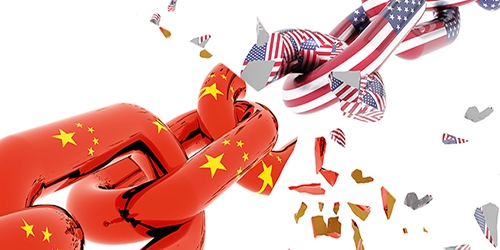Automakers Confused By Trump's Tariffs: Impacts And Analysis

Table of Contents
The Initial Shock: Announcement and Market Reaction
The sudden nature of tariff announcements under the Trump administration significantly impacted the automotive industry. The lack of clear communication and prior consultation with industry stakeholders created widespread uncertainty and hampered strategic planning.
Unexpected Tariff Announcements:
- Example 1: The surprise imposition of steel and aluminum tariffs in 2018 immediately impacted automakers reliant on imported materials.
- Example 2: Subsequent threats of tariffs on imported vehicles from specific countries created further volatility and uncertainty.
- Example 3: The inconsistent application and frequent changes to tariff rates further complicated matters for automakers attempting to plan long-term strategies.
This unpredictability led to a chilling effect on investment. Automakers hesitated to commit to new projects or expansions, fearing further unexpected policy shifts that would render their investments obsolete.
Immediate Market Volatility:
The immediate aftermath of each tariff announcement was marked by significant market volatility.
- Stock Performance: Major automakers like Ford, General Motors, and Fiat Chrysler Automobiles experienced noticeable dips in their stock prices following major tariff announcements.
- Investor Sentiment: Investor confidence plummeted as the uncertainty surrounding trade policy increased the risk associated with investing in the automotive sector.
The correlation between tariff announcements and market fluctuations was undeniable, highlighting the profound impact of trade policy on investor sentiment and market valuation within the automotive industry.
Supply Chain Disruptions: A Global Impact
Trump's tariffs had a profound impact on global supply chains within the automotive industry. The increased costs of imported parts and materials forced automakers to re-evaluate their manufacturing strategies and sourcing methods.
Increased Production Costs:
Tariffs significantly increased the cost of production for automakers.
- Example 1: Tariffs on steel and aluminum led to a substantial increase in the cost of vehicle bodies and chassis components.
- Example 2: Tariffs on imported electronic components, tires, and other parts further added to the production cost burden.
- Example 3: These increases often exceeded 10-20% for specific components, significantly affecting overall vehicle manufacturing costs.
The resulting increase in production costs directly affected vehicle pricing and competitiveness in both domestic and international markets.
Geopolitical Shifts in Manufacturing:
To mitigate the impact of tariffs, many automakers began shifting production facilities and supply chains.
- Example 1: Some companies relocated production to countries outside the affected trade zones, such as Mexico or countries in Asia.
- Example 2: Others focused on sourcing more parts and materials domestically, leading to a re-evaluation of supplier networks.
- Example 3: This shift created a new geopolitical landscape for the automotive industry, with long-term implications for manufacturing hubs and employment patterns.
These shifts represent a fundamental reshaping of the global automotive landscape, driven largely by the unpredictable trade policies of the Trump administration.
Impact on Consumers and the US Economy
The consequences of Trump's tariffs extended beyond the automotive industry itself, significantly affecting consumers and the US economy.
Higher Vehicle Prices:
Tariffs directly contributed to higher vehicle prices for consumers.
- Price Increases: Data shows a clear correlation between the implementation of tariffs and increases in the average transaction price of new vehicles.
- Consumer Spending: Reduced affordability led to lower consumer demand, impacting sales figures for many automakers.
The decreased affordability of vehicles negatively impacted consumer spending and broader economic growth.
Job Losses and Economic Uncertainty:
The uncertainty created by Trump's tariffs and the subsequent restructuring of the automotive industry led to job losses.
- Job Losses: While precise figures are difficult to isolate, several studies suggest a link between tariff-related challenges and job losses within the US automotive sector and related industries.
- Economic Ripple Effect: The impact of job losses extended beyond the immediate automotive sector, affecting related industries like parts manufacturing and transportation.
These economic consequences highlighted the broader ramifications of unpredictable trade policies on the overall health of the US economy.
Long-Term Consequences and Lessons Learned
The impact of Trump's tariffs on automakers necessitated significant restructuring and adaptation within the industry. These experiences hold valuable lessons for future trade negotiations.
Restructuring and Adaptation:
Automakers responded to the challenges of Trump's tariffs through various strategic changes.
- Supply Chain Diversification: Many automakers diversified their supply chains to reduce dependence on single-source suppliers and mitigate the impact of future trade disruptions.
- Automation and Technology Investments: The increased cost of labor in some regions incentivized investments in automation and other technologies to improve efficiency.
- Strategic Partnerships: Some companies formed strategic alliances and partnerships to better navigate the complexities of global trade.
The resilience and adaptability of the automotive industry in the face of these unexpected challenges are noteworthy.
Policy Implications for Future Trade Negotiations:
The experience with Trump's tariffs offers valuable insights for future trade policymaking.
- Transparency and Predictability: Future trade policies should prioritize transparency and predictability to foster long-term investment and stability.
- Collaboration and Consultation: Greater collaboration and consultation with industry stakeholders are crucial to ensure that trade policies are informed and realistic.
- Sustainable Trade Practices: A focus on sustainable and equitable trade practices that benefit all parties involved is essential for long-term success.
The unpredictable nature of Trump's tariffs underscores the importance of developing more robust and collaborative approaches to international trade negotiations.
Conclusion
The confusion caused by Trump's tariffs on automakers had profound and lasting impacts on the global automotive industry. From supply chain disruptions and increased production costs to higher vehicle prices and economic uncertainty, the consequences were far-reaching. Understanding the complexities of these tariffs and the lessons learned is crucial for shaping future trade policies and ensuring the stability of the global automotive market. To stay informed on the latest developments in international trade and its effects on the auto industry, continue following news and analysis on Trump's tariffs on automakers and related keywords.

Featured Posts
-
 The Implications Of Fortnite Removing Game Modes Player Concerns And Developer Responses
May 03, 2025
The Implications Of Fortnite Removing Game Modes Player Concerns And Developer Responses
May 03, 2025 -
 Understanding The Political Moment Examining Voter Turnout In Florida And Wisconsin
May 03, 2025
Understanding The Political Moment Examining Voter Turnout In Florida And Wisconsin
May 03, 2025 -
 Poppy Atkinsons Funeral Manchester United Fan Laid To Rest
May 03, 2025
Poppy Atkinsons Funeral Manchester United Fan Laid To Rest
May 03, 2025 -
 Is That Really Christina Aguilera New Photos Raise Photoshopping Concerns
May 03, 2025
Is That Really Christina Aguilera New Photos Raise Photoshopping Concerns
May 03, 2025 -
 The Mental Health Crisis In Ghana Exploring Solutions To A Growing Problem
May 03, 2025
The Mental Health Crisis In Ghana Exploring Solutions To A Growing Problem
May 03, 2025
Latest Posts
-
 The Impact Of Potent Cocaine And Advanced Smuggling Techniques On The Global Drug Trade
May 04, 2025
The Impact Of Potent Cocaine And Advanced Smuggling Techniques On The Global Drug Trade
May 04, 2025 -
 Electric Motors Breaking Chinas Supply Chain Dominance
May 04, 2025
Electric Motors Breaking Chinas Supply Chain Dominance
May 04, 2025 -
 The Special Little Bag Practicality And Charm Redefined
May 04, 2025
The Special Little Bag Practicality And Charm Redefined
May 04, 2025 -
 Fatal Multi Vehicle Accident Near Yellowstone Seven Dead
May 04, 2025
Fatal Multi Vehicle Accident Near Yellowstone Seven Dead
May 04, 2025 -
 King Charles And Prince Harrys Communication Breakdown Over Security
May 04, 2025
King Charles And Prince Harrys Communication Breakdown Over Security
May 04, 2025
